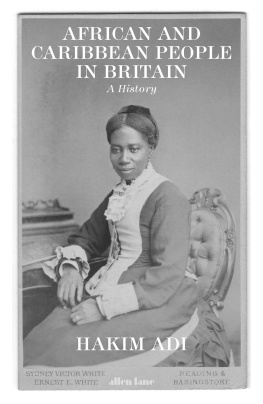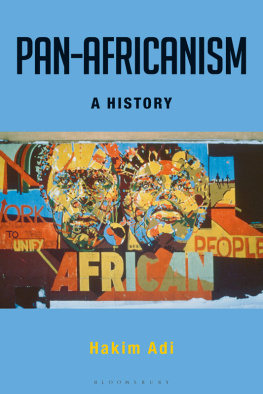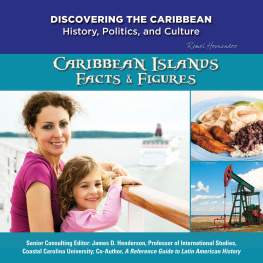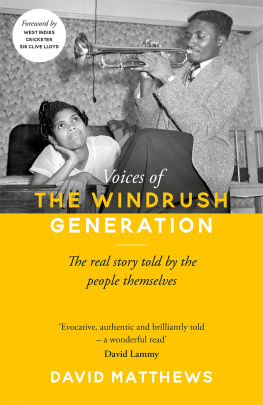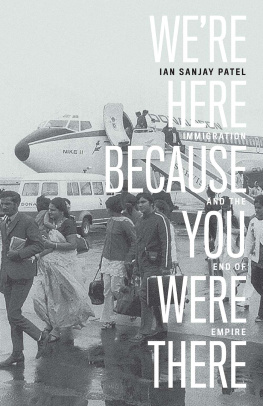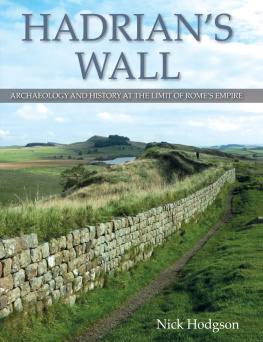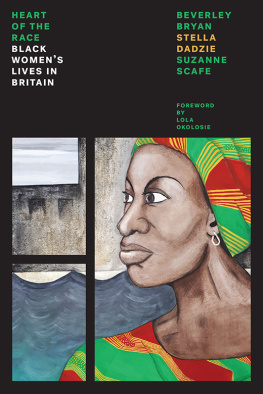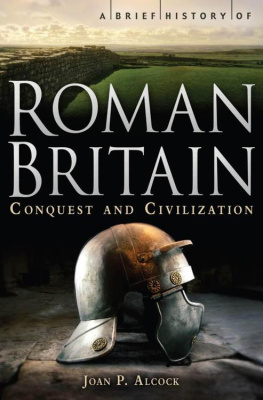About the Author
Hakim Adi is Professor of the History of Africa and the African Diaspora at the University of Chichester. The first historian of African heritage to become a professor of history in Britain, he has been researching and writing about the history of African and Caribbean people in Britain for decades. He is the founder and consultant historian of the Young Historians Project.
Acknowledgements
It has often been remarked that the writing of history is a collective rather than an individual effort. Consequently, the author has to accept criticism for shortcomings, but any praise should be equally shared between all those who have contributed. I take this opportunity to thank all those who have helped to bring into being this publication. What is presented here has been developed over many years of teaching and discussion with students, most recently at the University of Chichester and initially at Middlesex University, where I was first appointed a lecturer in Black British History in 1996. I have also benefited from questions and comments posed over an even longer period by those who kind enough to attend my lectures, as well as classes and discussions in numerous other places, many of them having nothing to do with universities. I remember, in particular, those valuable contributions and questions from guests and patients at Broadmoor Hospital, HMP Manchester and HMP Ashfield.
I would especially like to than my editor at Penguin, Casiana Ionita, who first approached me with the idea of writing such a book and has seen it through to completion. For the first time Ive had an editor who has actually edited my work and made many useful suggestions. I would also like to thank Louisa Watson, an indefatigable copy editor, who also make many helpful suggestions and corrections. My thanks also to Edward Kirke for finding all the photos with great speed and efficiency.
At the University of Chichester, I received continual and important support from Prof. Hugo Frey and from all those colleagues associated with the universitys Research and Innovation Fund, which generously contributed to the cost of photos. I would also like to thank Karen Lloyd, Gail Graffham, Sue Booker, Jane Rackstraw and other librarians at the University of Chichester. In addition, I received support from the staff at many libraries and archives who fulfilled my many requests for articles, books and documents. I would particularly like to thank Hannah Ishmael, Rhoda Boateng at the Black Cultural Archives in London, Geoff Burns at Birmingham Archives and Collections, as well as Safina Islam and Joanne Robson at the Ahmed Iqbal Ullah Education Trust in Manchester for their help in supplying important archival material.
Several colleagues and friends, including those who might be considered my students, have generously shared the results of their knowledge and research with me. I would particularly like to thank Zainab Abbas, Cleo Blyden, Makeda Coaston, John Ellis, David Featherstone, Amelia Francis, Hannah Francis, Kelly Foster, Trevor Getz, Sonia Grant, David Horsley, Askala Miriam, Marika Sherwood, Adisa Stevens, Laura Tabili, Claudia Tomlinson, and Elizabeth Williams.
I am also very grateful to my friends Zainab Abbas, Marika Sherwood and Tee White who were kind enough to read drafts of this book. Thank you for correcting errors as well as making many very helpful suggestions.
Last, but certainly not least, many thanks to Esther, always a rock in bad times and in good.


1
The Early African Presence
In January 2016, Mail Online and several other media outlets in Britain announced that a new GCSE history course for Britains school pupils, focusing on migration, was likely to teach them that the nations earliest inhabitants were Africans who were in Britain before the English.
Fryer, the author of Staying Power: The History of Black People in Britain, first published in 1984, and continually in print since that time, began his carefully researched survey of 2,000 years of British history with the sentence, There were Africans in Britain before the English came here.
The presence of Africans in Britain during the Roman period has been established by historians for many years. It is therefore correct to say that Africans were present before the settlement, centuries later, of Angles, Saxons and Jutes, although perhaps incorrect to say that these migrant communities are the main ancestors of the modern English.
A significant development in understanding this early history was the revelation in February 2018 that those who might be considered some of the first Britons that is the first to provide genes that can be found amongst some of the modern inhabitants of Britain had dark to black skin, as well as dark hair and blue eyes. Indeed, one newspaper headline boldly proclaimed that according to the latest DNA study the first Britons were black. The analysis of the skeletal remains of Cheddar Man also demonstrated significant scientific advances. Although the analysis of DNA has been possible for several years, techniques have markedly improved in the twenty-first century and created the possibility for new revelations about the ancient population of Britain in the future.
It has long been known that Britain was the place of cremation of the African emperor, Septimius Severus, who was Libyan-born and of Berber origin. Britain was also governed by several other Africans, including Quintus Lollius Urbicus, who came from what is Algeria today, was Governor of Britain from 139142 CE and supervised the building of the Antonine Wall in Scotland. Several other African Roman governors also originated from what is today Libya, Tunisia and Algeria, as did numerous military commanders and soldiers.
For some years, historians have known that Africans were part of the Roman army of occupation in Britain, especially connected with the period when Severus and his sons ruled the Roman empire. In short, there is much evidence of the presence in Britain not only of African soldiers but also civilians from what are today Libya, Tunisia and Algeria, all part of the Roman province of Africa at the time (itself a place name possibly derived from a language spoken in the region that was subsequently applied to the entire continent).
The latest archaeological and scientific techniques have been utilized to analyse human remains found in what was the Roman city of Eboracum, now York, where Emperor Septimius Severus died in 211 CE . At the beginning of the twentieth century people digging in a street in York discovered a 1,700-year-old stone coffin of a woman. She had been buried with jewellery, including jet and ivory bracelets, as well as other valuable possessions, and was undoubtedly of elite status. It was not until 2010 that archaeologists were fully able to analyse the skeleton, which they discovered to be that of a young woman, probably between eighteen and twenty-three years old and of North African origin.
Another young woman from North Africa has been discovered by archaeologists and scientists analysing human remains from the Roman period at the Museum of London. Tests showed that the Lant Street Teenager, who was only fourteen at the time of her death, had been born in North Africa but probably had ancestors from south of the Sahara. The teenager had only been living in London for a few years, prompting questions about the circumstances of her migration. Another skeleton found in London is of a middle-aged African man who had probably grown up in London and suffered from diabetes.

